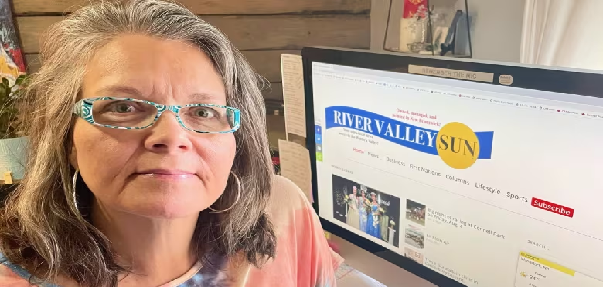NEWS
One year after news ban, Canadian journalism is suffering — but Meta isn’t budging……I’m tired of……….See more

‘I’m tired of feeling like we’ve been forgotten about,’ says New Brunswick publisher

Losing the ability to share news on Facebook has hurt Theresa Blackburn’s bottom line and her newspaper’s ability to serve her community — and as she works around the clock to keep her business afloat, she’s pleading with lawmakers to make a deal with Meta so publishers can once again share their content.
Blackburn’s free newspaper, the River Valley Sun, covers “ultra-local” news in New Brunswick’s Western Valley, a rural stretch of the western part of the province serving about 35,000 to 40,000 people.
Her business, Black Tartan Media, lost the ability to share its content on Meta platforms, including Facebook and Instagram, last August — along with all other news media in Canada — following the passage of C-18, known as the Online News Act.
A year later, Blackburn says she’s struggling to keep her two publications, the River Valley Sun and the ageless NB magazine, running.
“I’m tired of feeling like we’ve been forgotten about,” she said. “We’re hanging on with one finger now on the edge of the cliff.”
Before C-18, the River Valley Sun — which distributes 6,000 free newspapers monthly — relied on Facebook to share content, instead of having its own website.
Blackburn said the paper saw between 400,000 to 500,000 engagements in a typical month before the news ban saw that audience abruptly cut off.
She’s since created a website that gets about 40,000 hits per month, a drop in engagement of about 90 per cent.
The ban is also causing financial pain.
Blackburn’s newspaper used to go live on Facebook at some local events, with the businesses paying for that coverage. Losing that ability has cost them the equivalent of two months of printing newspapers, she said, or the cost of hiring a summer student.

No Meta deal in sight
The Online News Act sought to force web giants like Meta to compensate media outlets for the journalism shared on their platforms.
The bill was pitched as a way to keep news outlets solvent after advertising moved en masse to digital platforms, virtually wiping out a major revenue stream for journalism.
Though Google and the federal government ultimately reached a $100-million deal, Meta has resisted, saying that its platforms don’t benefit unfairly from people sharing links to news content.











